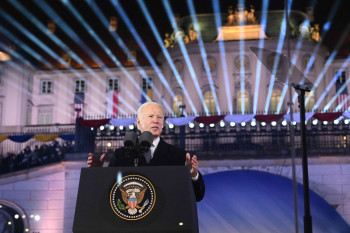The United Nations has expressed concern over Russian President Vladimir Putin’s decision to withdraw from the New START treaty, which is aimed at the reduction of states’ nuclear arsenals.
“A world without nuclear arms control is a far more dangerous, unstable one, with potentially catastrophic consequences,” UN spokesperson Stephane Dujarric said, as reported by Sky News.
“Every effort should be taken to avoid this outcome, including an immediate return to dialogue,” he said.
Putin announced that Russia would be withdrawing from the New START treaty in his address to the Russian parliament on Feb. 21.
The New START treaty, signed in 2010 in Prague, is an agreement between the United States and Russia to reduce their nuclear arsenals. The treaty imposes limits on the size and makeup of the nuclear stockpiles of both nations. This treaty has been the only remaining arms control agreement between the two countries.
Putin attempted to justify this decision by claiming that "the goal of the West is to inflict a strategic defeat on Russia, to end us once and for all. We will respond accordingly because we are talking about the existence of our country."
In response to Putin's speech, U.S. National Security Advisor Jake Sullivan said that "Nobody is attacking Russia. There’s a kind of absurdity in the notion that Russia was under some form of military threat from Ukraine or anyone else."
NATO Secretary General Jens Stoltenberg criticized Russia’s decision to suspend its participation in the New START treaty during a joint press conference on Feb. 21 with Foreign Minister Dmytro Kuleba and the EU’s top diplomat Josep Borrell.
"With today’s decision on New START, the whole arms control architecture has been dismantled," Stoltenberg said. "I strongly encourage Russia to reconsider its decision and to respect existing agreements."
He added that Russia has violated and withdrawn from other key arms control agreements over the years.










